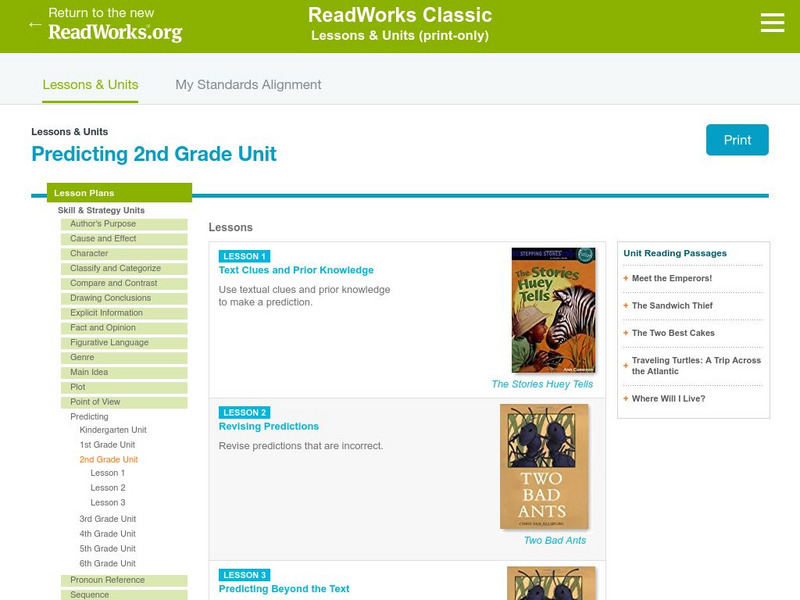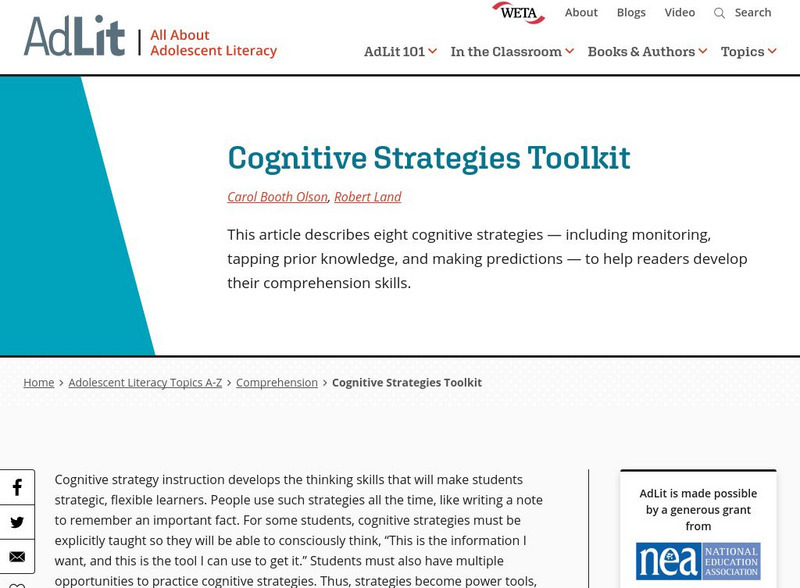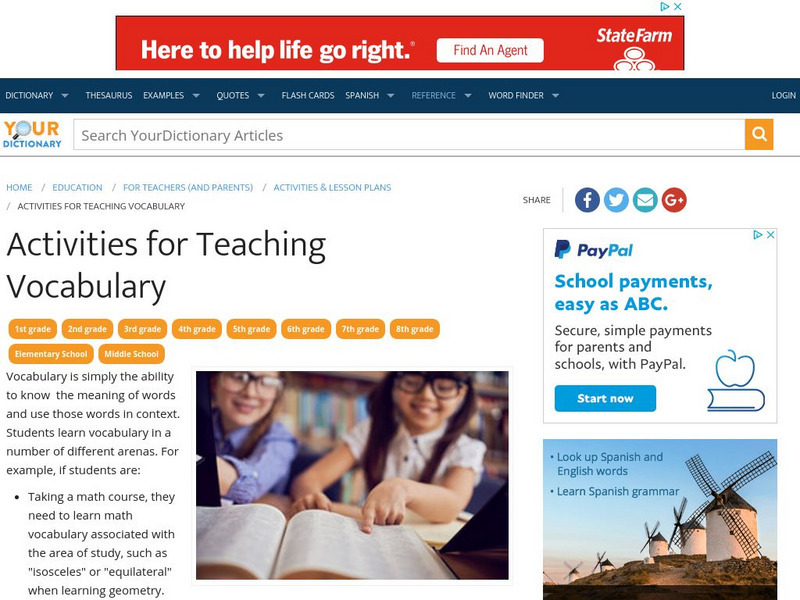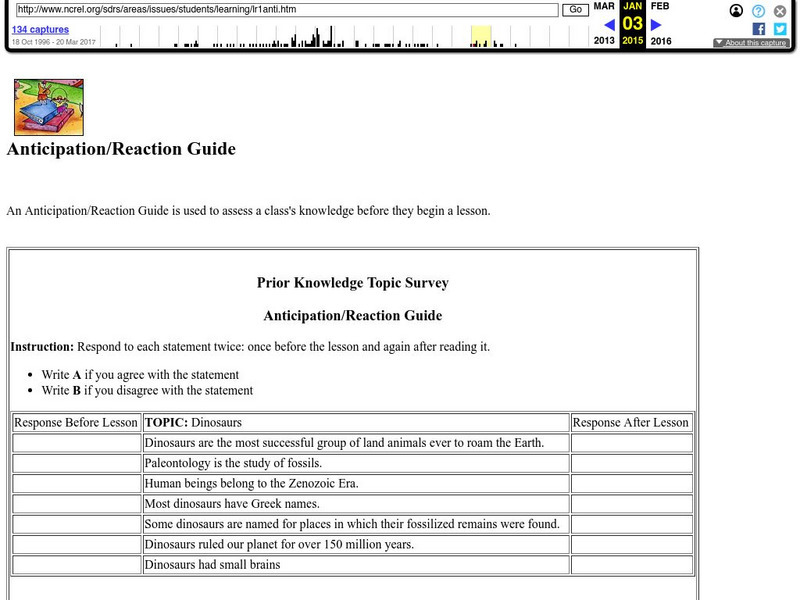New York State Education Department
TASC Transition Curriculum: Workshop 11
You'll C-E-R a difference in classroom achievement after using a helpful lesson plan. Designed for economics, civics, government, and US history classes, participants practice using the CER model to craft arguments about primary and...
EngageNY
TASC Transition Curriculum: Workshop 12
How can opinions slant facts? Workshop participants learn how to examine primary and secondary sources and identify the author's point of view. They also examine how visual art impacts the meaning and rhetoric of sources. Full of...
Edutopia
Edutopia: Are You Tapping Into Prior Knowledge Often Enough in Your Classroom?
Learning progresses primarily from prior knowledge, and only secondarily from the materials we present to students, studies show. This article offers some research behind why we need to stop hurrying through lessons and take the time to...
Reading Rockets
Reading Rockets: Building Background Knowledge
The importance of background knowledge is especially salient in the age of Common Core. This article offers practical classroom strategies to build background knowledge such as using contrasts and comparisons and encouraging...
Florida Center for Reading Research
Florida Center for Reading Research: Monitor for Understand: Background Knowledge [Pdf]
A lesson plan in which students preview a text and complete a graphic organizer to activate prior knowledge. Materials are included.
Science Education Resource Center at Carleton College
Serc: Investigating Honeybees: Using a Quiz to Access Prior Knowledge
Using Dadant's Honeybee Study Prints, students learn about honeybee anatomy, reproduction, and behavior.
Thinkport Education
Thinkport: Revolution and the Power of Words
A module where students will determine the meaning of unfamiliar terms using prior knowledge, context clues and examination of word parts.
Florida Center for Reading Research
Florida Center for Reading Research: Monitor for Understanding: Background Check [Pdf]
A lesson plan in which young scholars browse a text and complete a graphic organizer to show prior knowledge. Materials are included.
Florida Center for Reading Research
Florida Center for Reading Research: Monitor for Understanding: What Do You Know? [Pdf]
A lesson plan in which young scholars browse a text and complete graphic organizers to help them activate prior knowledge. Materials are included.
ReadWriteThink
Read Write Think: K W L S Chart
A printable K-W-L-S sheet to help students activate prior knowledge, ask questions, record new learning, and then ask additional questions to extend inquiry beyond the text . Directions on how to use this type of graphic organize as well...
Read Works
Read Works: Predicting 2nd Grade Unit
[Free Registration/Login Required] A series of three lesson plans designed to teach students to use textual clues and prior knowledge to make predictions and revise incorrect predictions. Lessons are based on the books The Stories Huey...
ReadWriteThink
Read Write Think: Acquiring New Vocabulary
This lesson teaches elementary students new vocabulary terms through book discussion groups. Students use context clues, prior knowledge, and print and online resources for vocabulary understanding in their discussion.
AdLit
Ad lit.org: Cognitive Strategies Toolkit
This article describes eight cognitive strategies - including monitoring, tapping prior knowledge, and making predictions - to help readers develop their comprehension skills.
Lumen Learning
Lumen: Rhetorical Reading: Strategies for Active Reading
This lesson focuses on strategies for active reading such as annotating your texts, reading multiple times, and using your prior knowledge.
Florida Center for Reading Research
Florida Center for Reading Research: Agree to Disagree [Pdf]
A lesson plan in which students read statements and then use prior knowledge to agree or disagree with each statement. Materials are included.
Florida Center for Reading Research
Florida Center for Reading Research: Monitor for Understanding: Strategic
A lesson plan in which students complete a graphic organizer to record prior knowledge before reading, ask questions while reading, and summarize a text after reading. Materials are included. [PDF]
Love To Know Media
Your Dictionary: Activities for Teaching Vocabulary
This article focuses on the importance of teaching vocabulary and how to teach it effectively. It lists concepts that need to be considered when preparing to teach vocabulary such as prior knowledge, dictionary use, context clues, and...
AdLit
Ad lit.org: Knowledge in the Classroom
Learning happens when we connect new information to what we already know. When children have limited knowledge about the world, they have a smaller capacity to learn more about it. Here are four ways teachers can build content knowledge...
Polk Brothers Foundation Center for Urban Education at DePaul University
Depaul University: Center for Urban Education: Share Knowledge: Fact Bank [Pdf]
This graphic organizer can be used to collect facts during a research task prior to writing about the topic or sharing what was learned in a discussion. Students will place facts in the boxes and then number the facts, according to the...
Other
University of Twente (Nl): Concept Mapping
Provides a great example of a concept map, along with information on concept mapping and mind mapping. Mentions the importance of prior knowledge in the integration of new information.
North Central Regional Educational Laboratory
Ncrel Anticipation: Reaction Guide
A model of a quick survey to give students to help them activate their prior knowledge of subject matter. Alter this survey to suit your particular subject.
North Central Regional Educational Laboratory
Ncrel K W L H Technique
A brief explanation and practical example of how to use the K-W-L-H technique to help students activate prior knowledge of a subject.
ClassFlow
Class Flow: Southwest Literacy Unit
[Free Registration/Login Required] This flipchart is a literacy unit based around a Southwest / Westward Expansion Theme. Native Americans, pioneers, and the old west is covered. 8 different literacy strategies are taught with FULL...
Other
Live binders.com: Reader and Task Considerations
Reader and task considerations including Cognitive Capabilities, Reading Skills, Motivation and Engagement with Task and Text, Prior Knowledge and Experience, Content and/or Theme Concerns, Complexity of Associated Tasks.
Other popular searches
- Activating Prior Knowledge
- Using Prior Knowledge
- Activate Prior Knowledge
- Place Value Prior Knowledge
- Activate Prior Knowledge Ak
- Accessing Prior Knowledge
- Prior Knowledge in Reading
- Prior Knowledge Lesson
- Activate Prior Knowledge Apk
- Applying Prior Knowledge



![Florida Center for Reading Research: Monitor for Understand: Background Knowledge [Pdf] Lesson Plan Florida Center for Reading Research: Monitor for Understand: Background Knowledge [Pdf] Lesson Plan](https://content.lessonplanet.com/knovation/original/509097-dcac4b1ededa02a055a699b5d16a0617.jpg?1661786978)

![Florida Center for Reading Research: Monitor for Understanding: Background Check [Pdf] Lesson Plan Florida Center for Reading Research: Monitor for Understanding: Background Check [Pdf] Lesson Plan](https://content.lessonplanet.com/knovation/original/509084-046e814f1a592c44b15b7d54a395601c.jpg?1661786997)
![Florida Center for Reading Research: Monitor for Understanding: What Do You Know? [Pdf] Lesson Plan Florida Center for Reading Research: Monitor for Understanding: What Do You Know? [Pdf] Lesson Plan](https://content.lessonplanet.com/knovation/original/509086-53a24983190dae0583572c16a6d92618.jpg?1661786994)





![Florida Center for Reading Research: Agree to Disagree [Pdf] Lesson Plan Florida Center for Reading Research: Agree to Disagree [Pdf] Lesson Plan](https://content.lessonplanet.com/knovation/original/509083-5064f95f26a4a1c3d3ba87981b20c878.jpg?1661786998)





